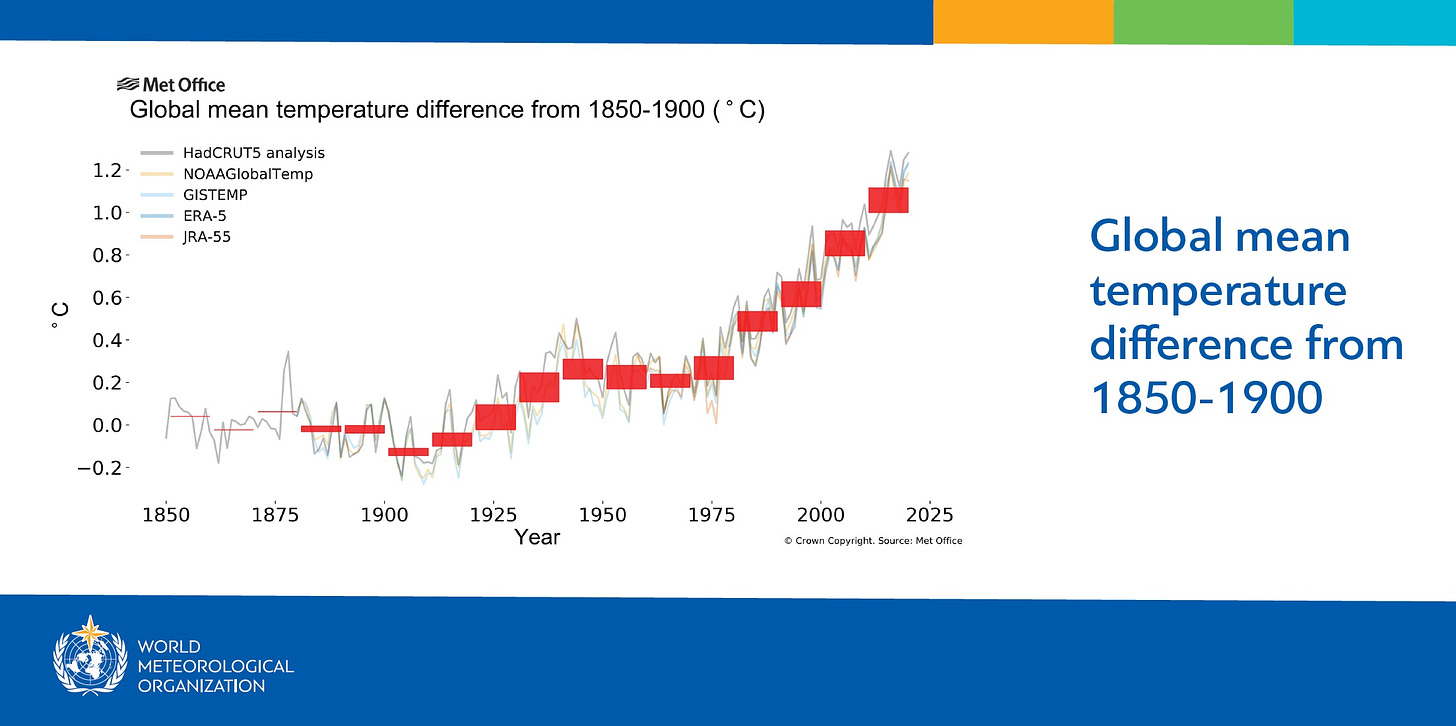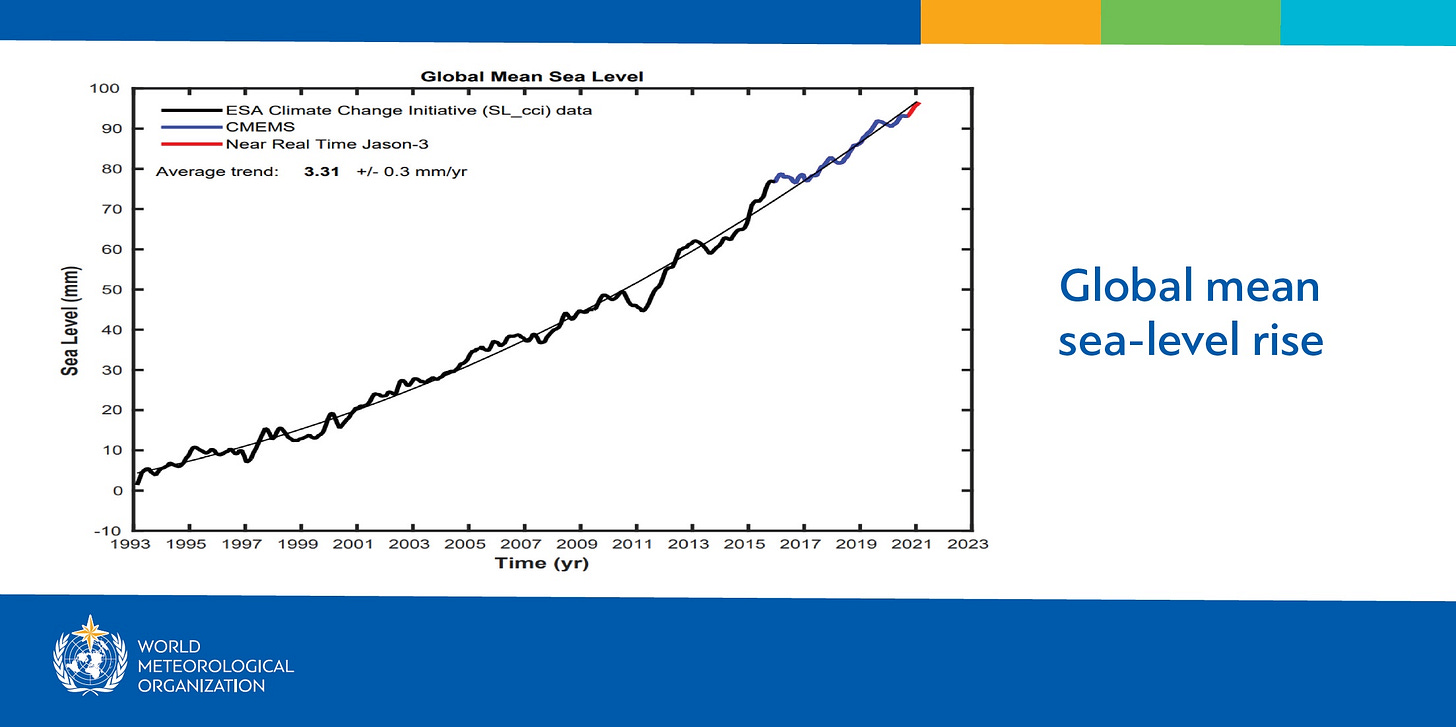12 reasons why 2020 was a bad year for climate change
The year 2020 was one of the three warmest years on record.
Despite the pandemic-related worldwide economic slowdown, climate change got worse in 2020. That is the main conclusion from the latest annual report of the World Meteorological Organisation (WMO). The year 2020 was one of the three warmest years on record. The past six years, including 2020, have been the six warmest years on record.
The WMO published the report just three days before Earth Day and the virtual Leaders Summit on Climate, hosted by President Biden on Thursday. It is also an essential contribution in the run-up to the COP 26 Climate Summit in Glasgow in November.
Somber conclusions
I have read these reports for many years, and they never fail to put me in a somber mood. We know what is happening, what causes climate change, that the impacts are getting worse every year, and that more people suffer. Worst of all, we know what is needed to change our course. It is possible to do with our present knowledge and technology; it is costly but much cheaper than not taking action, and that transformation also brings enormous benefits. We know it all. But every year, there is not enough action by our leaders in politics and business that prefer short-term successes above long-term sustainability. We collectively lack a sense of urgency.
But there are some hopeful signals
But this year, I do see some hopeful signals. I do notice a change. Unlike only a few years ago, I hear people around me talk about climate change and sustainable solutions. Their worries and hopes seem to find their way into politics and business finally. This last year, we have seen a worldwide wake-up call during the pandemic that the forces of nature can disrupt all aspects of life on a global scale. The conclusions of this report, the pandemic, and the increasing awareness of the urgency make the commitments expressed by the world leaders later this week so important. The sudden positive change in American politics since the start of the Biden Administration gives hope for ambitious goals. We will have to wait for the two-day Climate Summit that starts on Thursday to see if the new plans are ambitious enough and if other countries will follow.
12 Key conclusions
These are some of the key findings in this year’s report on the State of the Global Climate.
Concentrations of the major greenhouse gases, CO2, CH4, and N2O, continued to increase despite the temporary reduction in emissions in 2020 related to measures taken in response to COVID-19.
The temporary reduction in emissions in 2020 related to measures taken in response to COVID-19 is likely to lead to only a slight decrease in the annual growth rate of CO concentration in the atmosphere.
In parts of northern Siberia, mean temperatures for the year were 6 °C or more above average. The heat culminated in late June, when temperatures reached 38.0 °C at Verkhoyansk on 20 June, provisionally the highest known temperature anywhere north of the Arctic Circle.
The global mean temperature for 2020 was 1.2 ± 0.1 °C above the 1850–1900 baseline, which places 2020 as one of the three warmest years on record globally.
The three-month period from July to September was the hottest and driest on record for the southwest United States.
Several enormous wildfires, including the largest fires ever recorded in California and Colorado, occurred in the western United States in late summer and autumn, contributing to the most extensive area burned nationally in the last 20 years.
The exceptionally active North Atlantic hurricane season resulted in a large number of landfalls. Twelve systems made landfall in the United States, breaking the previous record of nine, and five of those 12 systems made landfall in the state of Louisiana.
Hurricanes, extreme heatwaves, severe droughts, and wildfires led to tens of billions of US dollars in economic losses and many deaths.
The trend in sea-level rise is accelerating. Also, ocean heat storage and acidification are increasing, diminishing the ocean’s capacity to moderate climate change.
In the Arctic, the annual minimum sea-ice extent in September 2020 was the second-lowest on record. The sea-ice retreat in the Laptev Sea was the earliest observed in the satellite era.
The Antarctic mass loss trend accelerated around 2005, and currently, Antarctica loses approximately 175 to 225 Gt of ice per year.
Some 9.8 million displacements, mainly due to hydrometeorological hazards and disasters, were recorded during the first half of 2020.
Disruptions to the agriculture sector by COVID-19 exacerbated weather impacts along the entire food supply chain, elevating levels of food insecurity.
Video
This is the short video that the WMO released together with the report.
A happy update on the Ingenuity Helicopter on Mars
I wrote before about Ingenuity, which you can find here. Some of you in the U.S. wrote to me that you got up at 6 am ET to watch Ingenuity’s first flight. Watch the video in this tweet if you haven’t seen it yet. It’s guaranteed to make you smile.


That’s all I have for today. Parts of our beautiful planet are so ruined that large areas look like Mars, while on Mars, we can now fly as we do already for 117 years on Earth. Thanks for getting this far, and my thanks to those who decided on the one-month birthday of The Planet to take a subscription. Some of you have now found out that you can also give this newsletter to someone else, a suggestion if you are looking for an original birthday present.










If this warming trend continues, many parts of the planet will become uninhabitable. We will see more refugees, climate refugees, and more extinctions of animal and insect species,
Although the flight of Ingenuity was exciting, we could use more ingenuity in fighting climate change. The clock is clicking.
Hi Alexander, I like the 12 key conclusions in todays newsletter. I will pay attention to the Climate Summit on Thursday 22nd. Getting educated everyday here is like being on the Lifelong Learning Track. Thank you! We are having a beautiful day here (-: